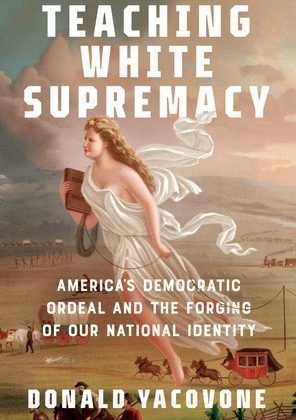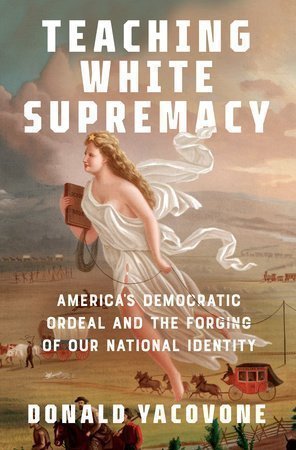

Over at Esquire, Abigail Covington interviews Harvard historian Donald Yacovone on his recent book, Teaching White Supremacy: America’s Democratic Ordeal and the Forging of Our National Identity. Here is taste:
ESQUIRE: You make it very clear from the start that this book is about, among other things, Northerners and the big New England publishers’ roles in creating, disseminating, and sustaining white supremacy.
Donald Yacovone: In my mind, this is the most important part of this study. Most people, at least outside of the South, tend to blame the South for slavery, even though it was in all the colonies. I’m not trying to absolve the South for its role in the suppression of African Americans by any means, but the ideology of white supremacy was far and away created in the North. It grew up alongside the institution of slavery and exists to this very day, as I try to point out in the epilogue of the book. And when you look at all major areas of culture and learning, religion, science, medicine, the law, clearly, it is Northerners who dominate. It was Northerners who created Jim Crow. It wasn’t the South.
This might seem like a weird question, but why do white people think they are so great? We weren’t the first people to inhabit the planet. We aren’t the tallest or the best looking. And yet the white person’s sense of superiority has existed for centuries, if not a millennium. As you point out in the book, white supremacy predates the founding of America. Where did it originate?
Well, that’s a really good and complicated question. There isn’t one place or event you can point to. The problem is by the time we get to the colonization of North America, it is very clear, and you can see this in Captain John Smith’s attitude, that it’s already been decided that Africans were an inferior people. The ideology of white supremacy would come later.
What is your definition of white supremacy?
The problem is it changes. It’s a malleable commodity because depending upon time, place, and political need, groups of people are included or excluded. For instance, in the 1830s and ’40s, as the number of Irish immigrants increased in the United States, they were considered inferior. In fact, the British referred to the Irish as a completely separate race, and that was the dominant American view when the Irish started populating the Northern states, but it changed. They became useful to the dominant white class because they could be used to replace Black workers. They could be used to exclude Africans from society, and so they earned their whiteness by discriminating against Blacks. African Americans used the term “Irish confetti” to refer to the blocks and bricks that the Irishman threw at them.
Donald, you’re describing whiteness, the race, and how it changed, but I asked you about white supremacy, the racist ideology. How do you personally define it? Is it simply the belief that white people are the dominant race and always will be?
It most certainly is that, but you have to step back even further and recognize that there’s no such thing as race. There’s no science or genetics to support it. It is a creation of people of European descent based on appearances and assumptions and turned into a science in the 19th century. And now we’re in the almost ludicrous position of having no races, but plenty of racism because people believe in race, even though it doesn’t exist.
So, what does white supremacy mean? Well, it means control. It means dominance of the political system, the social system, and of identity. It’s the belief that Americanness means whiteness, and that whites are the dominant and the most numerous. Of course, what we’re seeing now is the fear that that identity is being destroyed because in 30 or 40 years, whites will be just one more minority.
Let’s talk about that. You note in your epilogue that textbooks have flared up in public and political discourse before, most notably in the early 2000s when Republicans started warning of “multiculturalism.” But what is it about our current political climate that’s causing another round of hysteria? Or what is it about textbooks?
A history textbook embodies everything that Americans are supposed to value. They embody all the greatness that Americans have achieved, and the whole point of American history or social studies textbooks is to pass on that inheritance from one generation to the next.
In some ways, there aren’t any more important books published in the United States if you’re looking at it from a cultural, political perspective. I didn’t want to use the word Bible, but they are kind of the Bible of American culture. They preserve what has been and they celebrate what will be because of American values and institutions. Therefore, it is perfectly sensible to me that they would be a prime battleground in our current cultural war. And since whatever they say wins the war, they become the battlefield. I anticipate this will go on for quite a while.
Read the rest here.